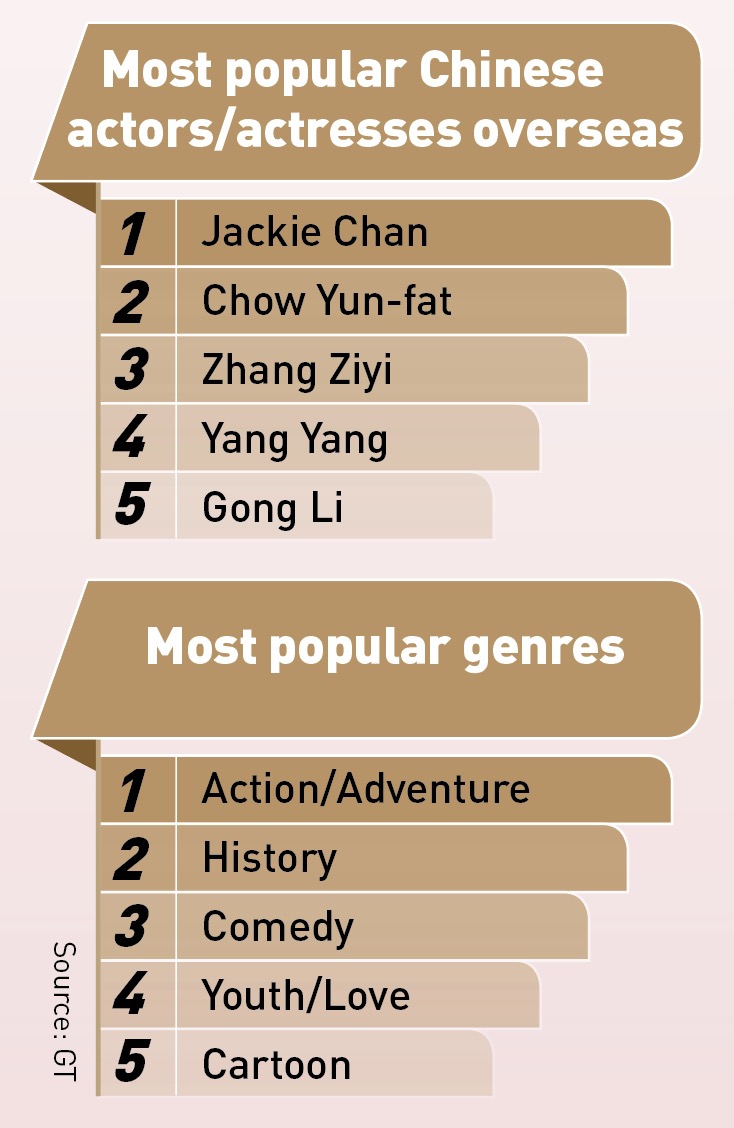Knowing from the screen: Intl markets keen on good Chinese stories: GT survey on Chinese film and television’s overseas audience
With the strengthening of China's overseas influence and the deepening of international exchanges and cooperation, more and more Chinese film and television works have entered the families and cinemas in other countries. In a recent survey by the Global Times, audiences in 10 countries said that action movies are still their favorite genre of Chinese film and television, and they hope to learn more about Chinese history, culture and society through these works.
According to data released by boxofficepro.com, as of November 30, the total box office in the Chinese mainland exceeded 28 billion yuan ($4 billion). In terms of TV dramas, works such as A lifelong journey, The long night and RESET, which have achieved good ratings and word-of-mouth in China this year, have landed well in overseas markets, continuing to demonstrate the influence of Chinese culture around the world.
From October 29 to December 6, the Global Times have launched a survey on the overseas audience's awareness and demand of Chinese film and television shows in 10 countries, including Japan, South Korea, the Philippines, Singapore, Saudi Arabia, Russia, France, the US, Brazil, and South Africa.
The survey aimed to explore the international public's understanding of Chinese film and television. The participants were members of the general public aged 18-70 years old coming from various countries and a total of 8,320 valid questionnaires were turned in.

Becoming popular
More than 80 percent of the respondents said that they have watched Chinese film and television, less than 20 percent of the respondents have never watched any.
What the respondents most want to learn about through Chinese film and television is Chinese history. Around 60 percent of the respondents from Saudi Arabia, Singapore, and the US expressed such a preference. In Japan, the rate was as high as 79 percent.
According to the survey, some of the principal reasons that overseas audiences are attracted to Chinese shows and films are "being fond of good Chinese film and television" and "understanding Chinese history, society, and culture".
Internet streaming (64 percent) and television (50.5 percent) are the main channels for the respondents to learn about Chinese film and television. Most internet users mainly use YouTube, Google and Netflix to access content.
Tan Fei, a Chinese producer and planner, told the Global Times that the Chinese film and television shows that are able to land in the overseas markets are firstly very popular in China, secondly, these works agree with the taste of a large part of the audience and lastly, a lot of effort has been put in the production of these works, such as in costumes, props and other details.
Many popular Chinese films and television shows, such as A lifelong journey, A Dream of Splendor and RESET, can be found and watched through a simple search on YouTube and Google. On Netflix, some hit costume dramas of this year, including Love between fairy and devil, Love like the galaxy and Immortal samsara have all been released.
Sun Jiashan, an associate researcher at the Chinese National Academy of Arts, told the Global Times that the serial dramas represented by Love between fairy and devil and Love like the galaxy are new types of film and television expressions based on China's popular cultural experience, including online fiction.
"Different from previous costume dramas and historical dramas, this new type of film and television drama is supported by a new idol culture and system, which is very attractive to young people," Sun said.
Sun also noted that some previously popular work, such as Minning Town and A beautiful daughter-in-law era, attracted the overseas audience with its reflection of a real Chinese society.

Chinese kung fu
The survey found that Jackie Chan is the favorite movie star among the respondents in all countries, followed by Chow Yun-fat, Zhang Ziyi, Yang Yang, Gong Li, Liu Yifei, Cheng Yi, Wang Yibo, Wang Hedi and Dilraba Dilmurat as TOP 10.
Tan said that kung fu movies have always been the vanguard of Chinese film and television abroad. From the earliest works starring Bruce Lee, Jackie Chan, Jet Li and other stars, to later films such as Crouching Tiger, Hidden Dragon and Hero, the kung fu movies have been able to showcase traditional Chinese elements vividly, allowing audiences to learn about Chinese culture directly.
According to the survey, among many types of films, the respondents are more likely to watch Chinese action/adventure movies and TV shows (39.5 percent), followed by history-related works (29.2 percent) and comedy (28.3 percent).
Among the 10 countries involved in the survey, 40.4 percent of Japanese respondents prefer to watch Chinese historical works. Around 35.9 percent of South Korean respondents favor dramas about power and love struggles in the imperial palace. For 37.3 percent of Russian respondents, Chinese shows and movies about the military and war are a favorite.

More to expect
When asked about the reasons why they watch Chinese movies or shows, 37.1 percent of the respondents answered that "In their countries they could hardly see any Chinese works on screen."
Around a third of the respondents also said that the content of the stories in Chinese televisions and movies do not appeal to them.
Sun believed that there are two main reasons why Chinese film and television are not attractive for overseas audiences. First, the themes and types of works produced lack diversity, secondly, from the perspective of industry development, the film and television industry is overly financially speculative and it is difficult for high-quality film and television companies to achieve profitability, causing bad money to drive out good money, thus lowering the quality of content.
The film and television works that could be exported globally are not only closely related to the country's cultural soft power, but also related to the level and capability of the creators. The two parts need to work hard together, Tan noted.
Tan predicted that in the future, films or dramas with realistic themes, such as A love for separation and Lighting up the stars, are expected to become new hot spots. "These works not only show the common problems faced by most people and promote positive life values, but also show China's influence and modernization level. Everyone will become more interested in this type of works."
According to data released by boxofficepro.com, as of November 30, the total box office in the Chinese mainland exceeded 28 billion yuan ($4 billion). In terms of TV dramas, works such as A lifelong journey, The long night and RESET, which have achieved good ratings and word-of-mouth in China this year, have landed well in overseas markets, continuing to demonstrate the influence of Chinese culture around the world.
From October 29 to December 6, the Global Times have launched a survey on the overseas audience's awareness and demand of Chinese film and television shows in 10 countries, including Japan, South Korea, the Philippines, Singapore, Saudi Arabia, Russia, France, the US, Brazil, and South Africa.
The survey aimed to explore the international public's understanding of Chinese film and television. The participants were members of the general public aged 18-70 years old coming from various countries and a total of 8,320 valid questionnaires were turned in.

A Dream of Splendor, a 2022 costume drama Photo: maoyan
Becoming popular
More than 80 percent of the respondents said that they have watched Chinese film and television, less than 20 percent of the respondents have never watched any.
What the respondents most want to learn about through Chinese film and television is Chinese history. Around 60 percent of the respondents from Saudi Arabia, Singapore, and the US expressed such a preference. In Japan, the rate was as high as 79 percent.
According to the survey, some of the principal reasons that overseas audiences are attracted to Chinese shows and films are "being fond of good Chinese film and television" and "understanding Chinese history, society, and culture".
Internet streaming (64 percent) and television (50.5 percent) are the main channels for the respondents to learn about Chinese film and television. Most internet users mainly use YouTube, Google and Netflix to access content.
Tan Fei, a Chinese producer and planner, told the Global Times that the Chinese film and television shows that are able to land in the overseas markets are firstly very popular in China, secondly, these works agree with the taste of a large part of the audience and lastly, a lot of effort has been put in the production of these works, such as in costumes, props and other details.
Many popular Chinese films and television shows, such as A lifelong journey, A Dream of Splendor and RESET, can be found and watched through a simple search on YouTube and Google. On Netflix, some hit costume dramas of this year, including Love between fairy and devil, Love like the galaxy and Immortal samsara have all been released.
Sun Jiashan, an associate researcher at the Chinese National Academy of Arts, told the Global Times that the serial dramas represented by Love between fairy and devil and Love like the galaxy are new types of film and television expressions based on China's popular cultural experience, including online fiction.
"Different from previous costume dramas and historical dramas, this new type of film and television drama is supported by a new idol culture and system, which is very attractive to young people," Sun said.
Sun also noted that some previously popular work, such as Minning Town and A beautiful daughter-in-law era, attracted the overseas audience with its reflection of a real Chinese society.

GT
Chinese kung fu
The survey found that Jackie Chan is the favorite movie star among the respondents in all countries, followed by Chow Yun-fat, Zhang Ziyi, Yang Yang, Gong Li, Liu Yifei, Cheng Yi, Wang Yibo, Wang Hedi and Dilraba Dilmurat as TOP 10.
Tan said that kung fu movies have always been the vanguard of Chinese film and television abroad. From the earliest works starring Bruce Lee, Jackie Chan, Jet Li and other stars, to later films such as Crouching Tiger, Hidden Dragon and Hero, the kung fu movies have been able to showcase traditional Chinese elements vividly, allowing audiences to learn about Chinese culture directly.
According to the survey, among many types of films, the respondents are more likely to watch Chinese action/adventure movies and TV shows (39.5 percent), followed by history-related works (29.2 percent) and comedy (28.3 percent).
Among the 10 countries involved in the survey, 40.4 percent of Japanese respondents prefer to watch Chinese historical works. Around 35.9 percent of South Korean respondents favor dramas about power and love struggles in the imperial palace. For 37.3 percent of Russian respondents, Chinese shows and movies about the military and war are a favorite.

Chinese actor Jackie Chan poses on the red carpet with two stuffed panda dolls during the 89th Annual Academy Awards in Hollywood, California on February 26, 2017. Photo: CFP/Frazer Harrison/Getty Images
More to expect
When asked about the reasons why they watch Chinese movies or shows, 37.1 percent of the respondents answered that "In their countries they could hardly see any Chinese works on screen."
Around a third of the respondents also said that the content of the stories in Chinese televisions and movies do not appeal to them.
Sun believed that there are two main reasons why Chinese film and television are not attractive for overseas audiences. First, the themes and types of works produced lack diversity, secondly, from the perspective of industry development, the film and television industry is overly financially speculative and it is difficult for high-quality film and television companies to achieve profitability, causing bad money to drive out good money, thus lowering the quality of content.
The film and television works that could be exported globally are not only closely related to the country's cultural soft power, but also related to the level and capability of the creators. The two parts need to work hard together, Tan noted.
Tan predicted that in the future, films or dramas with realistic themes, such as A love for separation and Lighting up the stars, are expected to become new hot spots. "These works not only show the common problems faced by most people and promote positive life values, but also show China's influence and modernization level. Everyone will become more interested in this type of works."




